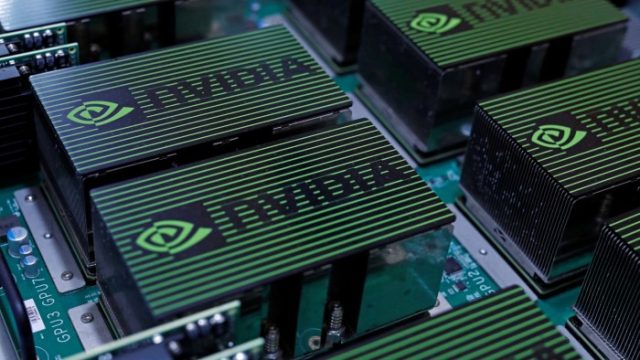Donald Trump’s administration is clamping down on Nvidia’s ability to sell artificial intelligence chips to China, forcing the Silicon Valley giant to take a $5.5bn hit to earnings and sending its shares sliding in after-hours trading.
Nvidia revealed new US controls on American chipmakers’ sales to China in a late-night regulatory filing on Tuesday. The curbs were subsequently confirmed by the commerce department, marking another escalation in Donald Trump’s trade war with Beijing.
The chipmaker said its H20 chip, which is tailored to comply with Biden-era export controls that already prevent the sale of its most powerful chips in China, would now require a special licence to be sold to Chinese customers.
Though it is still unclear how many such licences will be granted, Nvidia said it would take a $5.5bn charge in the quarter to April 27 related to H20 chips for “inventory, purchase commitments, and related reserves”.
Analysts estimate Nvidia will generate around $17bn in sales to China customers in the current financial year.
Because the H20 chip is less powerful than those Nvidia can sell outside China, customers in the rest of the world may be unwilling to buy up stock that Chinese buyers are now unable to receive.
China’s shortage of domestic chip suppliers that can build products to rival Nvidia’s had meant its tech companies were flocking to buy H20s, even in the face of potential tariffs imposed by Beijing on imports in response to Washington’s trade war.
The US said the new controls were necessary to address the risk of H20 chips being used in “a supercomputer in China”, Nvidia said in its filing.
The company said it was notified of the new controls on April 9 and was further told on Monday that the licence requirement for H20 and any similar chips “will be in effect for the indefinite future”.
Nvidia’s shares fell 6 per cent in after-hours trading on Tuesday, while futures tracking the tech-focused Nasdaq 100 index declined more than 1 per cent.
Stocks in Hong Kong fell on Wednesday, led by major AI chip buyers Alibaba, down 5 per cent, and Baidu and Tencent, both falling 3 per cent.
Washington’s crackdown on H20 chips is the latest example of how the US is using tariffs and other trade barriers to increase pressure on Beijing.
Trump has already increased tariffs on Chinese imports to 145 per cent, although some consumer electronics have received a temporary reprieve.
White House press secretary Karoline Leavitt on Tuesday urged China to cut a new trade deal with the US, saying, “the ball is in China’s court”.
The US commerce department confirmed later on Tuesday it was issuing new export licensing requirements for the H20, as well as AMD’s MI308 and equivalent chips. It was “acting on the president’s directive to safeguard our national and economic security”, a spokesperson said.
AMD is Nvidia’s closest direct competitor in the AI data centre chip market. The company did not immediately respond to a request for comment. Its shares were down 7 per cent in after-hours trading.
Broadcom, whose custom AI chips are sold to customers including China’s ByteDance, also fell 3 per cent after hours, though it was unclear whether its products would be affected, while Intel was 2 per cent lower.
The US’s move underscores how Nvidia, the chip designer at the heart of the AI boom, which saw unchecked growth over the course of last year and briefly became the world’s most valuable company, is exposed to geopolitical tensions between Washington and Beijing.
On Monday, the Trump administration launched a national security probe that could lead to new tariffs on semiconductors, as it holds off from immediately applying steeper levies on chips.
Nvidia said on Monday it would spend up to half a trillion dollars on US AI infrastructure over the next four years through partnerships with companies including Taiwan Semiconductor Manufacturing Company and Foxconn. The Financial Times had first reported on its investment plans.
Nvidia introduced its China-focused H20 processors last year after the Biden administration imposed export controls on its chips. They are less powerful than its top range of graphics processing units, or GPUs, coveted by Microsoft, OpenAI, Meta and Amazon.
Despite its reduced performance, the H20 has still seen solid demand in China. But Beijing has taken steps to encourage local tech companies to use homegrown chips from companies such as Huawei, and could freeze out Nvidia’s products with new energy-efficiency rules.
Bernstein analysts on Tuesday said the H20 accounted for about $12bn of Nvidia’s $17bn in China revenues over the past year, while there was a lack of clarity at this stage on whether licences might be granted, or whether it amounted to a full “wipeout” of the product line.
The US is worried China will be more successful building supercomputers, which can be used for everything from the development of hypersonic weapons to modelling for nuclear weapons, to help the People’s Liberation Army.
China has repeatedly accused the US of using national security tools, such as export controls, to throttle its economic development. The Chinese embassy in Washington did not respond to a request for comment.
An “AI diffusion” rule, introduced in the last days of the Biden administration, is set to come into force in May unless the Trump administration decides to unwind it. It would impose far stricter controls on where the most powerful US chips can be exported to, using a “tiered” licensing system that caps exports for all but a small number of countries.










